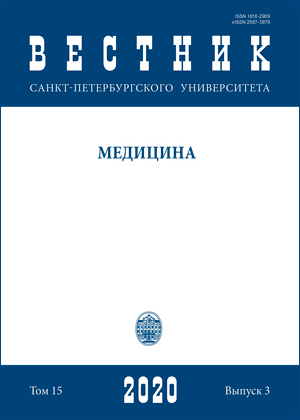Metabolic disorders and gut microbiota*
DOI:
https://doi.org/10.21638/spbu11.2020.302Аннотация
Obesity, type 2 diabetes mellitus, metabolic syndrome are metabolic widespread disorders that arise both under the influence of external factors (physical inactivity, high-calorie diet) and under the influence of internal factors. The latter includes the intestinal microbiota which deserves more and more attention in developing new strategies for the correction of metabolic diseases. The discovery of new approaches for the gut microbiota study (metagenomic, metabolomic) gives a new insight into the diversity and involvement of intestinal bacteria in the metabolic processes of the whole organism. This article are reviewed the mechanisms of the gut bacteria impact on lipid and carbohydrate metabolism, the relationship of bacteria species and their metabolites with tissue insulin sensitivity, body mass index. Special attention in the regulation of tissue insulin sensitivity is paid to the role of short-chain fatty acids and secondary bile acids, which are metabolites of gut bacteria. Understanding the influence of human microbiota and its metabolites on lipid and carbohydrate metabolism provides the basis for the development of new approaches to the prevention and treatment of socially significant metabolic diseases such as type 2 diabetes mellitus, obesity, metabolic syndrome.
Ключевые слова:
microbiota, metabolic disorders, lipopolysaccharide, short-chain fatty acids, bile acids
Скачивания
Библиографические ссылки
References
M., Cenit M. C., Deelen P., Swertz M. A., Weersma R. K., Feskens E. J. M., Netea M. G., Gevers D.,
Jonkers D., Franke L., Aulchenko Yu. S., Huttenhower C., Raes J., Hofker M. H., Xavier R. J., Wijmenga
C., Jingyuan Fu. Population-based metagenomics analysis reveals markers for gut microbiome composition and diversity. Science, 2016, vol. 352, no. 6285, pp. 565–569.
Загрузки
Опубликован
Как цитировать
Выпуск
Раздел
Лицензия
Статьи журнала «Вестник Санкт-Петербургского университета. Медицина» находятся в открытом доступе и распространяются в соответствии с условиями Лицензионного Договора с Санкт-Петербургским государственным университетом, который бесплатно предоставляет авторам неограниченное распространение и самостоятельное архивирование.




